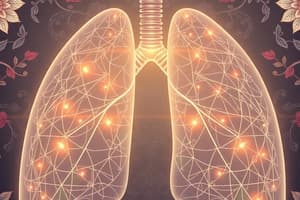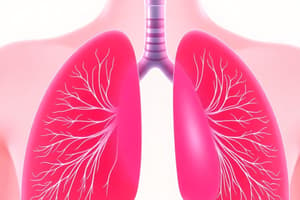Podcast
Questions and Answers
What is the formula for calculating Vital Capacity (VC)?
What is the formula for calculating Vital Capacity (VC)?
- TV + ERV + RV
- TV + IRV + RV
- TV + IRV + ERV (correct)
- TV + IC + ERV
Total Lung Capacity (TLC) is the sum of Vital Capacity (VC) and Residual Volume (RV).
Total Lung Capacity (TLC) is the sum of Vital Capacity (VC) and Residual Volume (RV).
True (A)
What is the maximum volume of air that can be inspired after normal tidal expiration?
What is the maximum volume of air that can be inspired after normal tidal expiration?
Inspiratory capacity (IC)
The maximum volume of air that can be expired after normal tidal inspiration is known as _______.
The maximum volume of air that can be expired after normal tidal inspiration is known as _______.
Match the following respiratory capacities with their definitions:
Match the following respiratory capacities with their definitions:
What is the tidal volume (TV) during normal quiet breathing?
What is the tidal volume (TV) during normal quiet breathing?
Residual volume (RV) refers to the air remaining in the lungs after a forceful expiration.
Residual volume (RV) refers to the air remaining in the lungs after a forceful expiration.
Name one factor that can impact lung volumes and capacities.
Name one factor that can impact lung volumes and capacities.
The extra volume of air that can be inhaled beyond the tidal volume is called __________.
The extra volume of air that can be inhaled beyond the tidal volume is called __________.
Match the following lung volume definitions with their correct terms:
Match the following lung volume definitions with their correct terms:
Which of the following best describes gas exchange?
Which of the following best describes gas exchange?
Expiratory reserve volume (ERV) is the volume of air exchanged during normal breathing.
Expiratory reserve volume (ERV) is the volume of air exchanged during normal breathing.
What is the approximate volume of inspiratory reserve volume (IRV) for males?
What is the approximate volume of inspiratory reserve volume (IRV) for males?
Flashcards are hidden until you start studying
Study Notes
Respiratory System
- Involves three steps: pulmonary ventilation, gas exchange, gas transport
- Pulmonary ventilation: Movement of air in and out of the lungs
- Gas exchange: External respiration (lungs to blood) and internal respiration (blood to tissues) via diffusion
- Gas transport: Transport of O2 and CO2 in blood using circulatory system
Respiratory Volumes
- Tidal volume (TV): Normal breath in and out (around 500 ml)
- Inspiratory reserve volume (IRV): Max extra air inhaled after a normal breath (around 3000 ml)
- Expiratory reserve volume (ERV): Max extra air exhaled after a normal breath (around 1000 ml)
- Residual volume (RV): Air left in lungs after maximum exhalation (around 1200 ml)
Respiratory Capacities
- Combined lung volumes
- Inspiratory capacity (IC): Max air inhaled after normal expiration (around 3500 ml)
- Expiratory capacity (EC): Max air exhaled after normal inspiration (around 1500 ml)
- Vital capacity (VC): Max air expelled after a deep inspiration (around 4500 ml)
- Total lung capacity (TLC): Total air in lungs after maximum inhalation (around 5700 ml)
- VC and TLC vary due to factors like age, size, muscle strength, pregnancy, and pulmonary diseases
Spirometer
- Measures lung volume changes over time
Studying That Suits You
Use AI to generate personalized quizzes and flashcards to suit your learning preferences.




